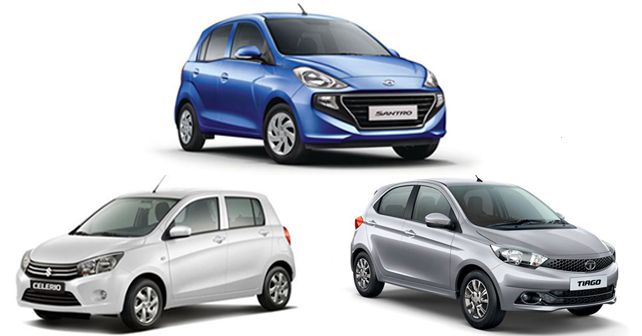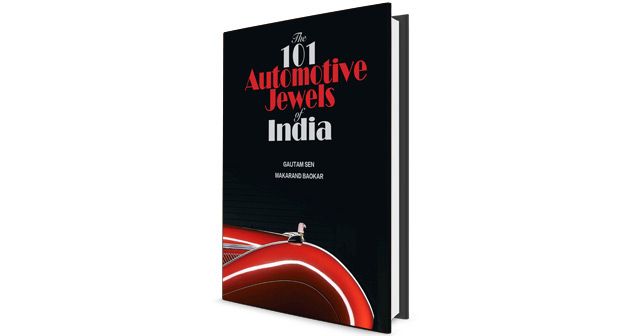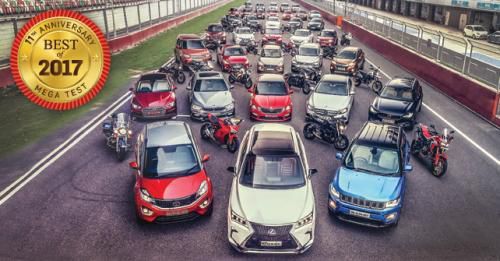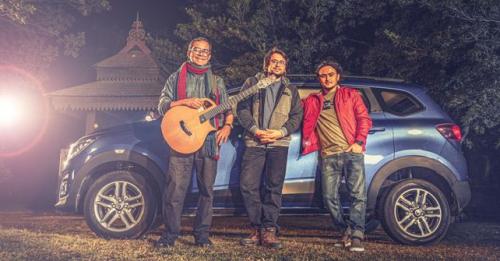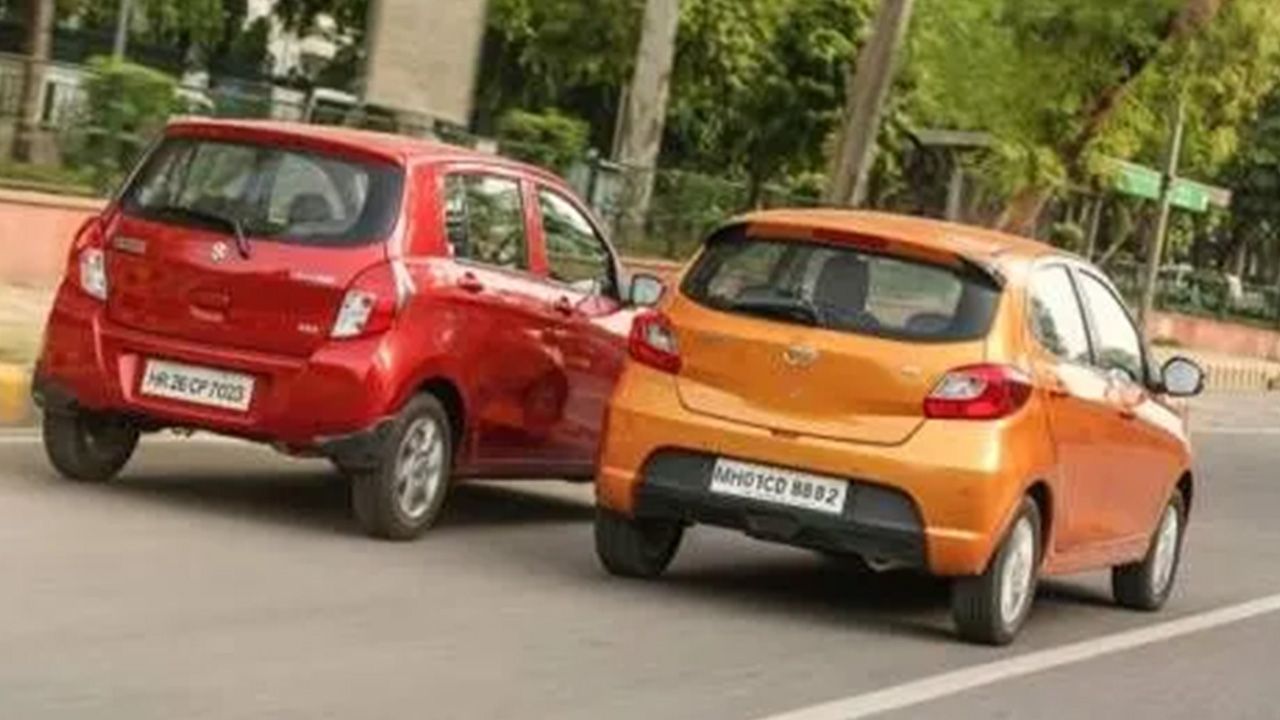Interview: Niki Lauda Straight Talk
Niki Lauda has never minced his words – and he doesn’t in this interview either, as he opens up about his accident, the scars, his rival James
By Quattroruote
Niki Lauda has never minced his words – and he doesn’t in this interview either, as he opens up about his accident, the scars, his rival James Hunt, the movie Rush, the dangers of F1, and the relationships that are important to him.
Niki Lauda has a rather cavalier attitude towards life. Perhaps that’s because the legendary Austrian race car driver knows that he’s fortunate to have survived a horrifying crash at the Nürburgring in 1976. On that fateful day, his Ferrari crashed, spun, and was struck by another passing car on its way to becoming a metallic inferno. Flames engulfed the cockpit, where he lay unconscious for what seemed like an eternity, until he was pulled out of the wreck by another driver – Arturo Merzario.
“Another 10 seconds (in the burning car), and I would have died,” Lauda recalls, enjoying a café creme while sitting in a plush sofa in his Vienna hotel suite. He’s been giving interviews off late to generate interest in Rush, a film about the rivalry between Lauda and British driver James Hunt as they were battling for the 1976 Formula 1 championship. Directed by Ron Howard, the film stars German actor Daniel Bruhl (Inglorious Basterds, The Edukators) as Lauda and Aussie hunk Chris Hemsworth as Hunt.
“Lauda and Hunt were rock stars of the race track – two absolute pros at the top of their game,” Howard observes. “It was a time when sex was safe, driving was dangerous, and all bets were off.”
The two men had become good friends over the course of the previous seasons and were the ultimate contrasts in personal and driving styles. Lauda was pragmatic, disciplined, and rigorous in his approach to racing whereas Hunt was a heavy drinking, sexually voracious, and, at times, reckless driver.
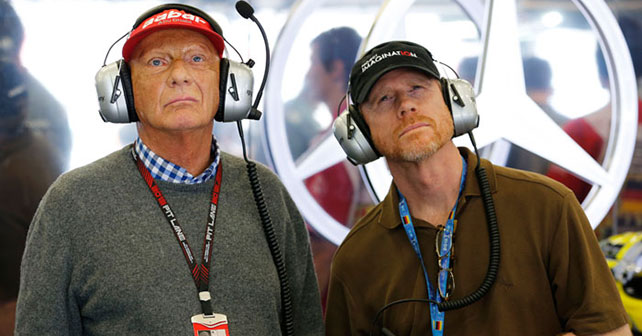
Death was a constant spectre and occupational hazard in their time. Formula 1 was the most dangerous sport in the world, and each passing year saw some of the most talented drivers lose their lives at the wheel of notoriously fragile race cars. In the middle of the 1976 season, Lauda came very close to becoming the latest victim when his car crashed and spun out of control on the notoriously dangerous Nürburgring track.
The flames that had engulfed his Ferrari had melted his right ear and forehead, and left his face badly scarred. He would spend the next few days lying in hospital in a coma with severe lung damage from the toxic fumes he breathed while sitting unconscious in the burning wreckage.
When he arrived at the hospital, the doctors were not optimistic about his chances for survival. “A priest came in to give me the last rites,” adds Lauda. But he pulled through, and was back on the race track at the Italian Grand Prix a mere six weeks later despite his weakened state. The defending Formula 1 champion, Lauda was still leading the 1976 points standings because of all the races he had won earlier in the season and was determined to fight for another championship.
“They (Ferrari team officials) questioned me, did I want to continue? But I always thought, yes, I do. I wanted to see if I could make a comeback. I knew about the risks. I was not surprised to have had an accident. All those years I saw people getting killed right in front of me.”
This is the essence of Lauda’s matter-of-fact, no-nonsense mentality. Despite his brush with death, despite being left horribly disfigured, the Austrian race car driver would return to the track, his head still bandaged, a mere six weeks later at the Italian Grand Prix in Monza. His burns had not yet fully healed, and his ravaged face caused some drivers to look away in horror. Lauda had also needed plastic surgery to allow him to close his eyelids properly. But he was determined to defend his championship, and was still ahead in the points race going into the climactic, season-ending Japanese Grand Prix.
The final race was run in a rainstorm, and many people feel that it should have been cancelled. As things turned out, Bernie Ecclestone and race organizers decided to go ahead knowing that there was a massive television audience anticipating a head-to-head battle between Lauda and British racer James Hunt driving in a McLaren.
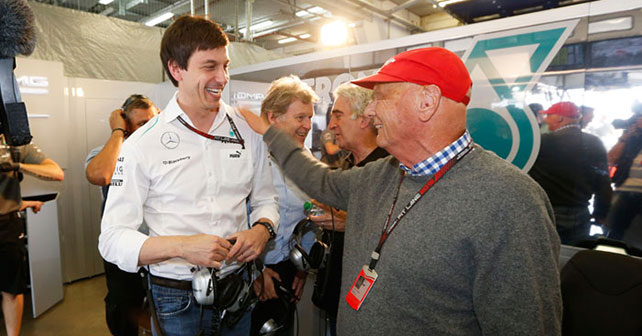
Hunt was only three points behind Lauda, and everything came down to that final race. As things turned out, Lauda dropped out on Lap 2 and Hunt would go on to finish third and claim his first and only Formula 1 world championship.
In this exclusive interview, Niki Lauda discusses how he refused to allow his brush with death to keep him from racing and moving forward in life.
Here are excerpts from the interview:
Niki, what was it like returning to the track after nearly losing your life a mere six weeks earlier?
After the accident, I came out into the world and when people looked at me they were shocked. It upset me. I thought they were impolite not to hide their negative emotions about my look. When I saw the movie, it let me see the story from the other side – from the point of view of other people looking at me. It helped me understand why people were shocked.
What was your own reaction to your scarring?
I accepted the way I looked at the time. I never thought about it, I just kept on going. But my wife (Marlene, whom he divorced in 1991), fainted when she first saw me. So, I knew it could not have looked good. I wondered, do I really I look that bad? As I get older, the scars get lost in the lines, and, well (shrugging his shoulders), you just get used to it.
Did you ever consider having plastic surgery to correct the scarring?
No. I only had to do surgery to improve my eyesight. Cosmetic surgery is boring and expensive, and the only thing it could do is give me another face. I had the eye surgery so that my eyes could function, and as long as everything functions I don’t care about it.
You have to accept it. You can’t think how you would be until it happens to you. When you are in that situation, you think differently – you think what do I do now, how do I find my own way of handling it, and when you’ve found it, it doesn’t bother you anymore.
Did plastic surgeons ever approach you in the months or years after your accident?
I was always being offered cosmetic procedures. See this little thing here (he gestures to the side of his face), this was done by Ivo Pitanguy in Brazil. He was the most famous plastic surgeon in the world at the time. But he wanted to do everything. He asked me, “Are you nuts? Why wouldn’t you want this?”
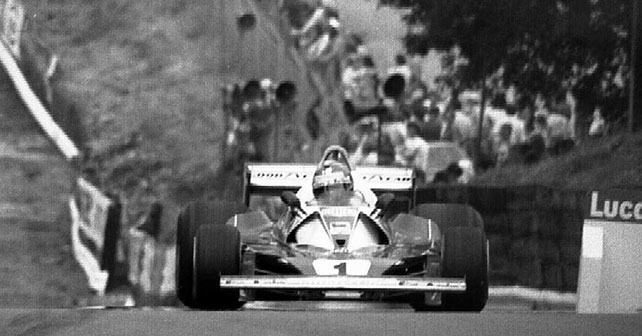
And what was your reason?
I just don’t like the look of plastic surgery. What do you think of the stupid women who get work done all the time? I think it’s bad. If you have something done, people can see right away that you’ve had surgery.
People who have never been in your situation, they can’t imagine what they would do. They just ask themselves why is he like this? Why doesn’t he do something about it? Maybe if they were in my situation, they would behave the same way as I did. Look at the women who have their lips done, and have all this shit (he mimics the trout pout)? I hate it because it becomes part of your personality.
Do you wonder why women resort to plastic surgery?
I can’t stand plastic surgery. You have to have enough personality to overcome this beauty bullshit and find the strength to love yourself the way you are. When women have plastic surgery it means they can’t stand whoever they are.
I’ve had a lot of incidents in the past where people were wondering how I looked. At least I can say I had an accident. The idea that people would work on themselves who haven’t had an accident, I can’t understand it.
Let’s talk about Rush. How did you feel about the way Daniel Brühl plays you in Rush?
I was very impressed. He did a good job. He speaks English better than me. He came to Vienna to meet me and studied me for a while. I also took him to the Brazilian Grand Prix a couple of years ago. I like him. I asked him what he found difficult. He said because people know me from television, interviews and talks, they know how you speak, so you can’t not get that right.
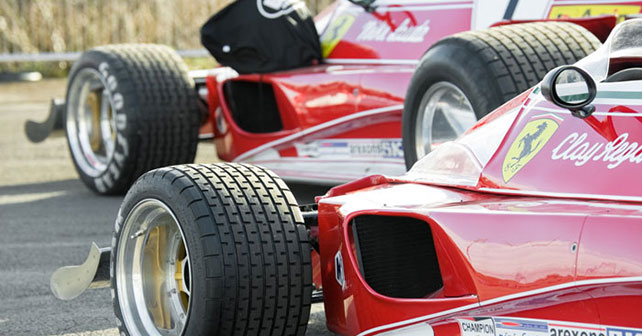
What was your mindset heading into the final race of the ‘76 season in Japan?
We went into the final race in Japan with me still ahead. It had been raining that week like you couldn’t believe, and, in my opinion, it was too dangerous to drive. So I pulled out after one lap. James finished third and won the title by one point, which was good for him. I was lucky to have survived that far, and I had the choice not to risk my life again.
How do you look back on your racing years?
In those days, it was always a fight to stay alive. You had to push to the limit without making any mistakes. I’ve had lots of positive and negative experiences. I don’t really have any fear. I’ve also learnt from my life experience. I think I was much less charismatic before (smiles).
I don’t know the reason I don’t have fear in me. I’m very secure, and always have been. I was brought up in a well-educated family here in Austria. I had a very good and stable personality from a very young age. Then I went through a lot of terrible things, like my accident, which again taught me how to be stronger. I’ve always been able to learn from my experiences and move forward.
What was your relationship with James Hunt like? The film Rush portrays you as extreme rivals who become friends out of mutual respect.
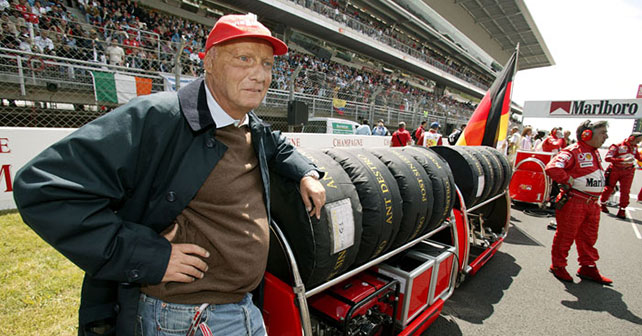
We were friends. I knew him before we met at Formula 1. We always crossed each other’s paths. He was a very competitive guy, and he was very quick. In many ways, we were the same. When I looked into his eyes, I knew exactly what was going on. I had a lot of respect for him on the circuit. You could drive two centimetres from his wheels and he never made a stupid move. He was a very solid, good driver.
Were you as serious and pragmatic as the film describes, and was Hunt your wild, womanizing polar opposite?
I liked his way of living. We all had lots of girlfriends. I was not as bad as James, but we were similar and I engaged in a little bit of what he did. I was not as strict in my personal manner as I appear in the movie, although I was more disciplined than he was. I would never drink before a race. Certainly after it, I had to.
Was that from the pressure of driving?
Every race could have been my last. It’s different today, but then it was a tougher time. Every race we went out and celebrated our survival – so we had a party. It was a different time. James was just more extreme, and the movie emphasised this. We never had rivalries over girls. With other drivers, I would have a beer after the race and then say goodbye. That was not friendship. With James it was different. James was different.
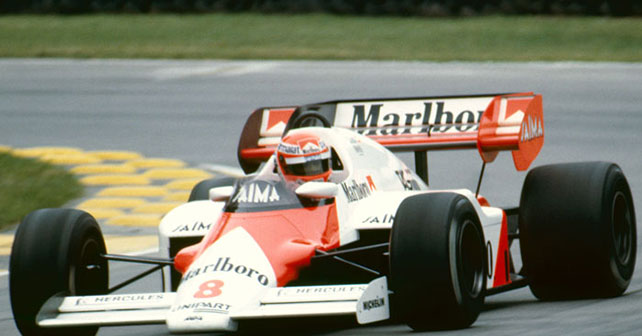
What are your best memories of James Hunt?
In many ways, he was my opposite. We both tried to win. It’s sad that he’s not here now sitting with me. He had a rough time. He was sober and clean for four years, and then had a heart attack. He died too early, too young. I wish he’d been here to see the movie. It would have been the best time (Lauda’s eyes well up).
Was there an element of danger that you thrived on as a driver in those days, knowing that you had a good chance of dying?
No, Formula 1 is simply about controlling these cars and testing your limits. This is why people race, to feel the speed, the car, and the control. If, in my time, you pushed too far, you would have killed yourself. You had to balance on that thin line to stay alive.
It was the precision, and not the danger that interested me. I was more technical than the other guys. I didn’t just want to make it go quicker, I wanted to understand the car so I knew exactly how to make it go quicker. I always knew that the car makes me successful and that the faster the car, the better were my chances of winning.
After you ended your Formula 1 career, having won another championship in 1984 after coming back out of retirement in the early eighties, you owned and operated your own airline, Lauda Air. Then there was a terrible accident in 1991 that killed all 223 passengers in Thailand. How did that affect you?
The crash of the Boeing 767 was the other terrible thing that happened in my life. I’ve been through a lot, and I realise the future can’t be controlled. I’m not worried. You can always learn to overcome difficulties.
You are still an avid pilot, and you fly your own airplane whenever you travel. Which do love more, driving or flying?
Cars are my profession. Airplanes I use for my own comfort. I’ve been a commercial pilot for many years, so if I want to go to Brazil I would go in my own plane. I go to any races I want on my Global 5000 12-seater airplane, which can fly for 12 hours at a time. I never fly commercial.
You subsequently operated another airline company (FlyNiki) and then sold that. Do you miss the airline industry?
No, I sold it as soon as I started the job I have with Mercedes (he runs their team). Air Berlin wanted me to sell. It was the right time and the right price, so I did.
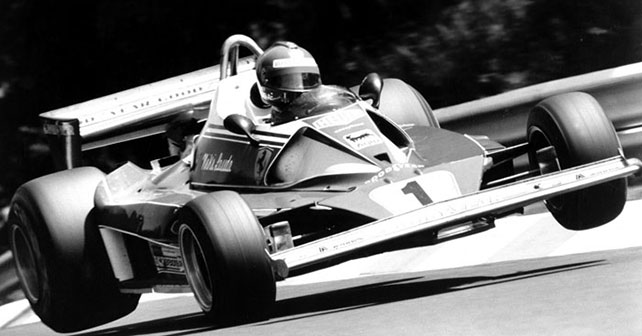
You’ve earned several hundred million from your various business operations and racing jobs. Was money a big motivating factor for you?
I’ve never worked for money. I’ve never raced for money. You cannot do this for the money. You have to first race, and if you are successful money comes. This is the way I’ve gone through my life. I did things I liked, and if I did it well the money followed. Money is not important to me at all, although it’s nice when you have it.
You got married again several years ago to Birgit Wetzinger (she had been a flight attendant for FlyNiki). How did you meet her?
I met her at a party, and I fell in love with her. It was one of those things where you see someone and you just know. I connected with her right away because of her boots. They were a pair of hippy type, flat boots – the opposite of the high heels that everyone else was wearing at the party. That was the first thing that made me interested in her.
But I didn’t know she worked for my airline – I only found out afterwards. To make a long story short, I asked her out and that’s where it started. We got married, and after eight months Max and Mia came along. She is a Scorpio, and I am a Pisces. Scorpios are very difficult to handle (chortles heartily).
In Rush, we see you meeting your first wife Marlene after you picked her up while she was hitchhiking. Is that a true story?
Actually I met her at a party, but I did drive her somewhere soon after – and she did not recognise who I was. She thought I was a tennis player.
The movie also shows you picking up hitchhikers and scaring them half to death when you drive at extreme high speeds?
That part is true (smiles)!
Would you like either of your twins to become race car drivers?
No, I hope not. But it’s too early to say. My daughter though is fearless. She climbs everywhere with not a care at all. She is like me. Right now, while I am here in Vienna this is actually my first time alone with the kids while my wife is in New York. I’m going to rush home after (this interview), because that’s when the nanny will leave and I’m looking forward to it. It’s a nice experience. Birgit said I would never be able to do it, but it’s all working out.
Are you still in touch with your first wife, Marlene?
Yes, very much so. She is part of our life. We have a house in Ibiza. She lives there. My old family and new family often get together. We went to a restaurant the other say, Marlene, Birgit and myself. She is an outstanding woman. When everyone is happy, she is happy. We were joined by Lukas and Mathias (his sons from his first marriage) and their girlfriends. There’s no issue at all.
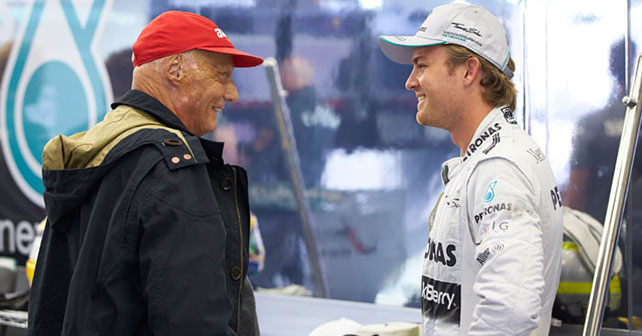
Marlene never wanted to get married. I wanted to get married because everyone I knew at 28 was married. Later on, I said I wanted to divorce and she said, “Okay, if you stay who you are and take care of me,” which I do. I have no problem with this.
So we got divorced, but we are still friends. Nothing has changed. What is more, Birgit is her friend too. It’s really an outstanding situation thanks to Marlene more than anyone else. She’s a secure, straightforward and warm hearted person, with a positive way of thinking.
You seem very cool, collected and pragmatic at all times. Are you like that in your private life?
I am emotional, but I don’t show it. I protect myself. I’m always being watched, so I cover myself. I cry easily when I see a stupid movie. I don’t know why, but I cry.
You recently had a kidney transplant. Do you think your kidney problems might be related to your accident at Nürburgring?
Nobody knows. This was my second kidney transplant. My brother gave me one of his kidneys, which lasted for eight years, and then I had one donated by Birgit (his wife).
Unbelievable. She was a perfect match for the kidney. At first, I refused to take her kidney. I found it impossible after only eight months of knowing me she wanted to donate an organ, but I felt responsible for her and she kept insisting. It was very hard to find a match. My son would have given me one, but he was not a match.
You also have another son, Christophe, from an extra-marital relationship. Do you see him much?
I have no contact with him. His mother wanted to have him on her own. That was it. He’s now 31, and I respect her wishes. I know him. We just don’t have day-to-day contact.
Could anything tempt you back into getting into a car and racing again now?
No. I’ve tried every type of car in every possible way. I nearly killed myself. I retired. I came back. I’m not interested any more. Now I behave (smiles mischievously).

